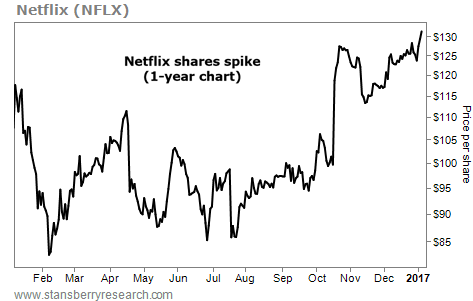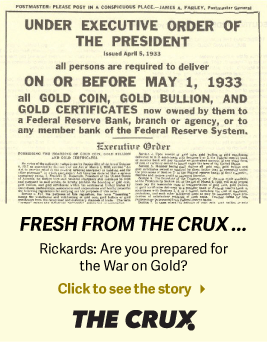| Home | About Us | Resources | Archive | Free Reports | Market Window |
Why I Don't Focus on the Overall MarketBy
Friday, January 6, 2017
Last fall, I attended the Latticework investment conference in New York.
Some of the world's greatest value investors were there. But what struck me the most was that there was a lot of kvetching about being unable to find any bargains in the U.S. stock market right now.
This is a common complaint after the market has done well for a time. But it's also a common complaint when the stock market has gone through one of its fits... when investors are down 20% or 30%... and stocks are falling out of the sky.
As I always tell people, there are thousands of stocks out there. If you don't want to have a big stock portfolio, you only need to find a handful of good ones. Five to eight... a dozen, tops. Surely, out of the thousands of names that are out there, there's got to be a dozen stocks worth owning.
That's why I don't focus on the overall market. Let me explain...
The idea of "stocks" is something that exists in our heads. Nobody owns stocks. What they own is ExxonMobil (XOM), or Apple (AAPL), or Facebook (FB). They own individual companies. And those individual companies are all different.
Just think about it. If you took a list of the top 10 best-performing S&P 500 stocks last year and compared it with a list of the 10 worst-performing stocks, you would get a huge disparity. It's just empirically true that all stocks are not the same.
But I hear it a lot. People say, "Stocks are expensive," or "Stocks are going to go up," or "Stocks are going to go down." But they're talking about an abstraction – something that doesn't exist in a practical sense.
I'm an individual. I invest in individual stocks.
So when people start talking about the overall market, it just doesn't have much meaning to me. Unless, of course, you're investing in broad market indexes.
By buying "the market," you're guaranteed an average return – no more, no less. But if you're going to try to escape from the average, you can't do what everyone else is doing.
If everyone else is saying, "There's no point in looking at individual stocks," or "You can't predict ahead of time what stocks are going to do"... then maybe thinking in a contrarian way will pay off.
It makes sense to look at individual stocks precisely because everyone else is focused purely on the indexes.
Consider the "Efficient Market Hypothesis," which states that all known information about financial assets is quickly reflected in their prices and that, therefore, it's impossible to "beat the market" without taking on extra risk.
Lots of studies support the Efficient Market Hypothesis. And lots of studies show that there are consistent holes in that hypothesis.
There are predictors outside of price. For example, companies run by owner-operators. Lots of studies show that if you invest in a company run by a CEO who owns, say, 10% of the company, shares in that company outperform peers where the CEO doesn't own stock.
Or take family-owned businesses versus businesses that are not family-owned. The family-owned peers do better. There would seem to be certain predictive attributes that you can use to your advantage as an investor.
The efficient market crowd would say I'm one of the lucky "dart throwers."
They'd say that, given a large enough number of investors all trying to pick stocks that beat the market, there's always going to be a certain subset that puts together a really good track record purely by chance. It's like the coin flipper who lands on heads 10 times in a row – it doesn't necessarily indicate skill.
This argument will never end. But starting with the assumption that the market is largely efficient – and therefore hard to beat – is not bad. It will make you careful as an investor. You can't just look at a stock and say, "Oh! This stock looks cheap." Maybe the market knows some things you don't... and what you think is cheap is actually fairly priced.
Conversely, you might say a stock looks ridiculously expensive. But again, there may be something you don't know or don't understand. I try to approach every stock like that – very carefully. I'm always asking: What expectations are built into this stock price? Does it make sense? What's the risk? What is the market seeing and what is it not seeing?
That's why I try not to focus on market moves too much. I focus instead on the underlying businesses. That's how I've made my living in the markets. I look at the individual trees when most people are looking at the forests.
Regards,
Chris Mayer
Further Reading:
"Too often, investors get caught up in macroeconomic trends and the drama of interest rates," Dave Eifrig writes. Instead, investors should be looking at businesses you can buy without worrying about major market trends. Read Dave's essay here: Buy These Companies and Ignore the Noise.
Investing legend Warren Buffett made his fortune by buying businesses that are easy to understand. By following certain basic principles, you can invest the same way. Brett Aitken explains how in his essay: Use the 'Warren Buffett Approach' to Safely Grow Your Wealth.
Market NotesANOTHER ENTERTAINMENT INDUSTRY WINNER Today's chart highlights the resurgence of home-entertainment giant Netflix (NFLX).
Today, more and more people are moving away from traditional cable options and instead making their own "bundles." The idea is that you can buy the services you want... and skip the ones you don't. There are a number of ways to do this, such as through Hulu, Amazon Prime Video, and HBO GO... but the biggest of them all is Netflix.
Netflix has grown its subscriber base from 7 million in 2007 to more than 86 million today. And like any growing company, it has also increased its offerings. Last month, Netflix announced that users can stream any of its content even when offline. Users can download videos when connected to the Internet, then enjoy them wherever they go.
As you can see, NFLX has recovered from its drop early last year. Shares are up nearly 60% from their February lows. And just yesterday, shares reached a fresh 52-week high. As folks continue to cut the cord and ditch their cable TV, Netflix shares will continue to benefit...
 |
Recent Articles
|



